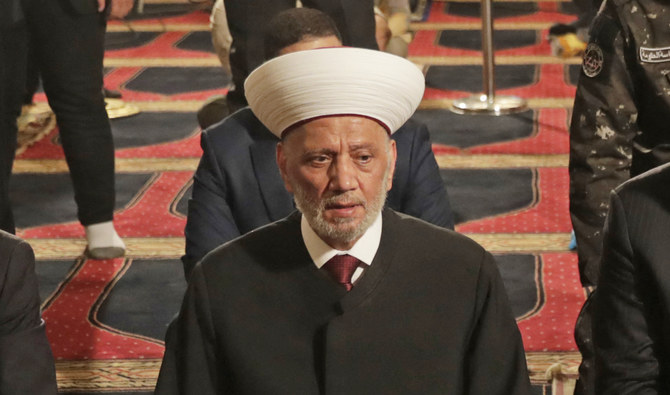
By Najia Houssari — arabnews.com — BEIRUT: Grand Mufti Sheikh Abdel Latif Derian has used his Eid Al-Fitr sermon to warn Sunnis against the danger of abstaining from participating in the upcoming parliamentary elections in Lebanon on May 15. In an address held at Al-Amin Mosque in the heart of Beirut, he told a crowd that included several Sunni candidates that “abstaining is the magic formula for corrupt people to come to power.” His warning comes after international observers said that Sunnis abstaining from the vote will allow the “growing influence of Hezbollah and its allies from the Sunni sect, through the winning of the party’s loyalists or its allies.The lower the turnout to the elections, the easier it becomes for Hezbollah to win in the Sunni areas.”
Derian’s remarks came as Eid Al-Fitr was celebrated amid a crippling financial hardship that has plagued the whole country. President Michel Aoun tweeted his greetings on the Islamic holiday: “May those with good converge toward the supreme interest of the nation to reach safety.” He added: “Let this feast be an invitation to all to rise above immediate interests and realize national hopes and ambitions for the advancement and recovery of our homeland.” Prime Minister Najib Mikati wished for “Lebanon to recover as fast as possible through everyone’s efforts and positive cooperation, as this is the only choice.” He added: “The repetition of mistakes is a crime, and the worst crimes are the ones committed against the homeland, under the pretext of defending it.”
Derian, the highest authority in Sunni Islam in the country, spoke on Monday on the grounds that “the enthusiasm of Sunnis in voting is declining” due to “people’s disgust from the ruling class and the poverty it led to,” an official in Dar Al-Fatwa told Arab News. They added: “The ‘Future Movement’ and its loyalists are some of the people abstaining from voting, despite former Prime Minister Saad Hariri not demanding boycotting the elections. However, they related to his decision for the movement to abstain from participating in the elections, on the level of candidacy and endorsement of candidates. They decided to abstain from voting due to their lack of conviction in Hariri’s replacements.”
Hariri’s decision led to most of his parliamentary bloc — with 19 seats — not contesting the elections. Mikati and predecessors Fouad Siniora and Tammam Salam, as well as former Interior Minister Nohad Machnouk, also decided not to run for the elections. The official said: “Hunger does not distinguish between sects and regions. We are united by our suffering from worsening crises and united by the national will to change our situation and overcome collapse and failure, thus achieving what we aspire to be, a state bearing a message and linked by genuine friendship with the Arab brothers who stood by Lebanon and the Lebanese people in the most difficult circumstances.”
Derian harshly criticized the authorities and described the situation as “very severe and harmful.” He added: “They try to make the abuser a well-doer and the criminal a hero, elevating the useless to the highest levels of praise and honor. They are the ones who transformed Lebanon into a failed state begging for water, electricity and bread.” He added: “None of those useless ones has the courage to admit what their dirty hands committed from corruption and ill-gotten money. They classify themselves as angels and saints in order to return to the crime scene again, and they inflict corruption. Beware of their deceptive and misleading statements.”
Derian stressed that “change and choice cannot be achieved from afar, nor by wishing. Those are achieved by massive active participation and speaking the truth on the ballot. Choosing the parliament’s members is the start of the desired reform. In national action, despair is not permitted, as it is surrendering to failure and corruption, suicide and death.” He asked: “Why do some candidates think that people are sheep threatened by force, even if they are hungry or scared? Social and humanitarian crises are only solved by the government and capable and effective state institutions.”



